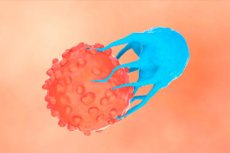New publications
Obe-cel demonstrates high efficacy and safety in the treatment of leukemia
Last reviewed: 03.07.2025

All iLive content is medically reviewed or fact checked to ensure as much factual accuracy as possible.
We have strict sourcing guidelines and only link to reputable media sites, academic research institutions and, whenever possible, medically peer reviewed studies. Note that the numbers in parentheses ([1], [2], etc.) are clickable links to these studies.
If you feel that any of our content is inaccurate, out-of-date, or otherwise questionable, please select it and press Ctrl + Enter.

A study published in the New England Journal of Medicine demonstrated that the new CAR T-cell therapy obecabtagene autoleucel (obe-cel) was highly effective in treating patients with relapsed or refractory CD19-positive B-cell acute lymphoblastic leukemia (B-ALL). Most patients did not require a stem cell transplant (SCT) after treatment.
Main results of the study
- Overall response rate: 76.6% in 127 evaluable patients.
- Complete remission: achieved in 55.3% of patients.
- Median event-free survival (EFS): 11.9 months.
- 6-month event-free survival: 65.4%.
- 12-month event-free survival: 49.5%.
- Median overall survival (OS): 15.6 months.
- 6-month OS: 80.3%.
- 12-month OS: 61.1%.
FDA Approval and Study Details
Based on these data, in November 2024, the US Food and Drug Administration (FDA) approved obe-cel for the treatment of adults with relapsed or refractory B-ALL.
The international, multicenter FELIX study included 127 adult patients with a median age of 47 years. Before obe-cel infusion, patients underwent lymphodepletion to create a “clear space” for CAR T-cell therapy.
- Study population: 74% White, 12.6% Asian, 1.6% Black, and 11.8% unknown race.
- Toxicity: Low levels of cytokine release syndrome (CRS) and neurotoxicity, typical of CAR T therapies, were observed. CRS grade 3 or higher occurred in three patients and neurotoxicity occurred in nine.
Results and long-term effectiveness
Of the 99 patients who responded to obe-cel, only 18 underwent stem cell transplantation, but no difference in EFS or OS was found between this group and patients without SCT, confirming the durability of the response to therapy.
- Minimal Residual Disease (MRD) Elimination:
- 68 high-risk patients (more than 5% blasts in bone marrow) achieved complete remission.
- 58 of 62 patients with available MRD data became MRD-negative after obe-cel infusion.
Conclusions and future applications
The study shows that obe-cel provides potent and durable efficacy in treating B-ALL with minimal toxicity. An upcoming presentation at the American Society of Hematology (ASH) annual meeting will further highlight the correlation between the depth of MRD-negative remission and clinical outcomes.
"These results confirm that obe-cel is becoming the standard of care for patients with relapsed B-ALL," said Professor Elias Jabbour, lead investigator of the study in the US.
Implications for clinical practice
Obecabtagene autoleucel opens up new options for patients with limited treatment options, improving their quality of life and length of life.
